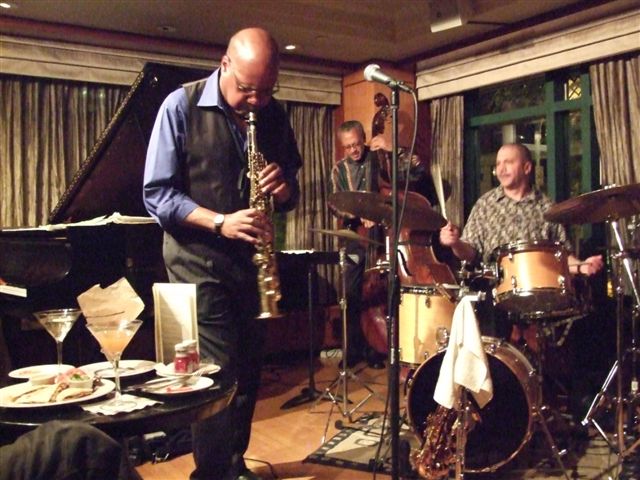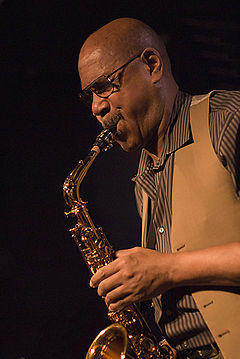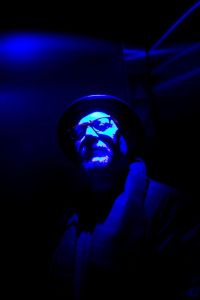posted by CHUCK KOTON, Photo Journalist Contributor
“ I was in the learning stage and I was going to jam sessions with guys who became the cats. ”
With an auspicious name like Sonny Fortune, could there be any doubt that this man would find success and fulfillment down whatever path he chose to follow in life. Fortune-ately for jazz lovers, he focused his talent and energy on the saxophone. Fortune’s destiny began at the beguine-ing; he was born at the right time, May 19,1939, and at the right place, Philadelphia. While the City of Brotherly Love has been considered a second-tier jazz city by some, Philly indisputably gave birth to and nurtured a long list of great musicians,many of whom went on to gain wider recognition after moving to New York.

The city’s fertile jazz ground may have first been seeded when bebop genius Dizzy Gillespie moved there from North Carolina in 1935. And those early seeds were surely fruitful and did multiply. John Coltrane’s family moved there(also from North Carolina), putting down roots on the city’s North Side in 1943. A short list of the many great players born there includes the Heath Brothers (Percy,Jimmy and Albert), Benny Golson, McCoy Tyner, Lee Morgan,Pat Martino and, more recently, Christian McBride and Joey De Francesco.
In a city with such a hip and historic jazz scene, Sonny Fortune did not have to go far to explore the music that would become his passion. In fact, he didn’t have to leave North Philly. “The scene was great,” Fortune says.”It [jazz] wasn’t something I had to go seek. The music was prevalent right there in the neighborhood.[Drummer] Sherman Ferguson lived about two blocks from me,and we ended up putting together the first band I played in.[Saxophonist] Odean Pope lived two blocks from me. Hasaan,the pianist, lived there. It was a very vibrant time.”
However, even though Fortune was born into this jazz incubator, he didn’t thrive immediately. He had picked up an alto saxophone but packed it away without making the necessary commitment to master the instrument. So what motivated Fortune to seriously pursue the music? “I had a horn and had become a little discouraged,” Fortune explains,”but at some point…Well, I guess it was my day job. I was working at a corrugated box factory, and it was clear that job was going nowhere. I was always having issues with my boss, trying to get better wages and better working conditions. I decided I had this horn in my closet. I didn’t know about any programs [job training], but I had this horn. It was at this point that I started practicing four hours a day after I got back from work.”
Once Fortune became more proficient, there was no shortage of jam sessions where he could really get a jazz education. “Oh man, there were a lot of cats there,” says Fortune. “Cats from North Philly, South Philly..Germantown guys…I was in the learning stage and I was going to jam sessions with guys who became the “cats”. [Bassist]Reggie Workman, [pianist] Kenny Barron…I had to sit there for the longest time waiting to play a tune I knew. These cats weren’t gonna accommodate me.”
Sonny’s neighbor, Odean Pope, suggested a way he could get more playing time. “I was frustrated,” Fortune continues, “but Pope said I should try and find some guys who were my peers and start a band. So I started a band with Sherman Ferguson and a couple of other guys from the neighborhood.” It was around this point in his development as a musician that Fortune began seriously listening to the music of another Philly saxophonist, John Coltrane, who would become his life-long inspiration. Fortune has admitted that when he first listened to Coltrane’s playing with Miles Davis, he didn’t think Coltrane knew what he was doing. However, after hearing My Favorite Things (Atlantic, 1960) at a friend’s house, he was blown away. He bought the album the next day and Coltrane’s spirit has imbued Fortune’s life and music ever since. Sonny even studied at the legendary Granoff School because “Trane went there.”
After paying his dues and achieving a professional level of proficiency, Fortune packed his bags and his horns and moved to New York City. He had learned all he could in Philadelphia, now he had to put himself to the test and go where all the great musicians lived and worked. In the late 1960s he began playing with the great Cuban conguero, Mongo Santamaria, and, as the band spent a great deal of time in Los Angeles, Sonny briefly relocated to the West Coast. However, the laid back vibe of L.A. was not inspirational enough and he returned to New York, where, after playing with Elvin Jones, Fortune joined the band of one of those great musicians from the old neighborhood in Philly, McCoy Tyner. Although they were somewhat familiar with each other from Philadelphia, years would pass before they became friends. “My ex-wife and I would be sitting on the steps and I’d see him walking in the neighborhood and at dances,” says Fortune, “but I really didn’t get to know him until I played with him at this gig in Chester,Pennsylvania .
During his years with Tyner (1972-74), Fortune established himself as one of the most dynamic sax players on the scene. His playing on several of Tyner’s recordings, including Sahara and Song For My Lady, both released in 1972 on Milestone, already displayed his signature intense, urgent modal sound. After this productive association it was time to move on and up. In two years, Fortune would be touring and recording with the legendary Miles Davis during the trumpeter’s electric fusion years. From his experience with Davis, Fortune “learned the importance of the rhythm section,” a lesson that would serve him well throughout his career.
Many years have passed since Fortune took control of his own destiny and embarked on a journey of musical discovery. Just think, if labor relations had been cool in that Philly box factory,
Sonny Fortune might never have pulled his alto out of the closet. Thank God for that day job!
follow Chuck Koton on Facebook or hipster sanctuary.com


Great article ! I invite u to check out my podcast night journey rewind I interview musicians
Thanks for your insight
James Graves
LikeLiked by 1 person
Thanks for a very nice article about one of the greatest saxophone players in the history of Jazz.
LikeLiked by 1 person
Reblogged this on Hipster Sanctuary and commented:
Great read Chuck.. I have some very fond memories of sonny. especially when I brought him in to san Francisco to give him an award for a congressional lifetime achievement at Plush Room in Knob Hill 2003
LikeLike